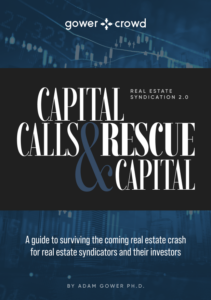213 AdaPia D’Errico, AlphaFlow


CFRE – An Educational Challenge
Indeed, informing people and really talking about the opportunities they have in crowdfunding real estate is very much an educational process. It really comes down to telling people about it in terms of what it is, what the benefits are, and what value it can bring to them. One must create a good sense of understanding and awareness. Crowdfunding has a complicated regulatory and legal framework. You can wrap it in very technical language with a lot of nuances and it can get they can get really overwhelming quite quickly. It is far better to provide digestible information that helps somebody understand what they are looking at and talking about.
AlphaFlow puts investors side by side with a registered investment advisers (RIAs) in the sense that they are both looking for the same thing; good risk adjusted returns. The company tries to help them understand what they want and how they can invest to achieve their goals. First, they consider their investment profile and risk tolerance as well as other portfolio goals that one should be looking at if one is a financial adviser before making an investment on behalf of a client. Then it is really about explaining to them the opportunity in the very simplest terms – for example, here is an investment that yields this return. You get X amount based on an investment of this size. At the end of it you receive this yield times the amount of dollars in invested plus you get your principal back.
AlphaFlow they actually go a little bit further and talk about overall portfolio with investors and RIAs. This is in contrast with non-regulated, non-registered companies that cannot have those kinds of conversations. It allows AdaPia and her team to have a broader conversation with investors which is really fabulous because that allows them to help understand the investor better. Consequently AlphaFlow can fully explain the benefits of their product and how it can fit within a client portfolio.
Leaders of The Crowd
Conversations with Crowdfunding Visionaries and How Real Estate Stole the Show
Discover how laws that gave us crowdfunding were solely meant to finance small companies and yet inadvertently opened the doors to allow you to invest in real estate like never before.
Read the book and listen to the actual conversations.
Acquiring Loans
AlphaFlow purchases loans from lenders; private money and bridge loans that are sometimes called hard money loans. The company talks to lenders who provide these kinds of loans to borrowers. The lender has a direct relationship with the borrowers and knows them well. This pool of lenders has little interest in the technology or the analytics where the algorithms are or the investment management style around which AlphaFlow operates. Rather, they look at AlphaFlow as a partner that is creating a secondary market for the loans they originate. From AdaPia’s perspective, she looks at the lenders from the perspective of how they underwrite, how they manage, how well they know their market, how well they understand their borrowers. Ultimately, if AlphaFlow is purchasing the loans they are taking on the risk. Consequently it is extremely important to understand the process of how a lender underwrites and truly who are they lending to.
How to Fund Your Deals
7 Steps to Raising Equity Online
Robo Advising
The AlphaFlow model involves implementing a complex algorithm on their portfolio to create optimal investment strategies for clients and investors. It can be easy for somebody to mistake what they as robo-advising. Certainly, this is what some of the big guys like Vanguard and Schwab are doing. They take certain principles of rebalancing and asset allocation and even tax loss harvesting and automate investment strategies around them. When you invest in one of these kinds of portfolios, you fill out a questionnaire about your risk tolerances and goals and capital available, amongst other things. This is often a big questionnaire at the beginning of the process. Then, when it comes time to invest your money, the process is basically constructed for you to allocate assets across your portfolio automatically. This is where the ‘robo’ comes in; there is no human interaction in terms of putting the whole thing together. It is not a financial plan. It is a portfolio of investments robotically compiled which is not the way AlphaFlow operates.
The Algorithm
AlphFlow has a team of very experienced portfolio managers who are actively working with lenders to identify deals and who also actively manage the selection and purchase of the loans that are purchased. These folk are highly skilled and actively management the real estate portfolio that AlphaFlow acquires. They utilize a suite of data analytics – for which they have attracted venture backing that is used to continue to build out the tools that enable portfolio managers to make better decisions, to better understand the markets, and to better underwrite the loans on properties in their portfolio.
When an investor makes an investment, let us say they put in a minimum amount of ten thousand dollars, within a few days it gets spread across 80 to 100 loans across the AlphaFlow portfolio which is constantly rebalanced on a daily basis. Rebalancing is done with the company’s proprietary algorithm. This is where the idea of a robotic function comes in; on the back end where AlphaFlow has some sophisticated principles at work terms of rebalancing money to optimize the investors’ portfolio according to individual risk tolerance.
At a basic level, AlphaFlow adopts a moderate risk profile portfolio wide where loan to value, being the most recognized indicator of risk, does not exceed 75 percent of the total weighted average. No loans are purchased from borrowers who are first time borrowers because experience is so massively important. Instead, loans are acquired from borrowers who have worked with a lender multiple times, and who has a good track record of paying back their loans.
AlphaFlow charges a 1 percent asset-under-management fee (AUM). There are no performance fees but they do have a right to charge other fees which could arise should a loan go into a default scenario. These fees would cover legal proceedings and things like that.
Tech Meets Real Estate
In thinking about real estate and technology, Zillow and Trulia are real estate companies truly centered in technology. There are also leasing technologies, and agent technologies, and then there is this real estate investment technology from which crowdfunding companies emerged as a result of the JOBS Act. This Act made it possible for companies to seek funding from individuals at scale using the Internet.
Client Base
Currently, AlphaFlow only accepts investments from accredited investors,but they also are seeing some institutional activity, interest from financial advisers and registered investment advisers and from family offices. They even have an endowment investing in the platform. The company does not offer a liquidity option so it is not, as yet, possible to trade invested funds although they are looking at ways to configure the platform to solve that problem. As a result, investors must basically leave their money invested for the duration of the loan which, for the most part, is a 12 month term.
Looking Ahead
Certainly with housing prices going up, margins for borrowers have been coming down in certain markets but globally, and not every market in the U.S. has peaked. AdaPia sees that some are just getting started. There are still pockets of opportunity having the expertise and the insight and the foresight into those markets becomes really important. AlphaFlow only looks at the markets that they have identified as being risk mitigated. Some of the data that they look at as is really based on historical pricing of the underlying asset. Part of their analytics suite allows them to look at the worst-case scenarios. They stress test markets against the worst housing market downturn– which as everyone knows was the 2008-2010 market.
That said, AlphaFlow looks at a 25 year period to identify the worst the market got and that is where they are basing their comfort level on the loan to value. Ultimately you have to look at every loan from the worst-case scenario which is that they may have to own that property at some point and sell it. That is why they are looking at what the lowest price was in any 12 to 18 month period over the last 25 years. From this they gain a different understanding of in the worst case and what they can sell it for and in order to recover principal.
The company is more interested in protecting the downside than necessarily in maximizing yield at least for their current moderate risk portfolio. Over time they would like to take on higher risk, higher return portfolios but that is a different game and a different investment altogether. For now their focus is on not losing principal.
AlphaFlow has started with the single family private money loans as an asset management platform. There are many opportunities in real estate and different kinds of real estate investment so ultimately the company wants to take the expertise that they are building in the single family residential space and apply that to other segments of the market. For example, looking at multifamily, or small balance commercial loans, or even potentially looking at equity project and are natural extensions of the current model. As the company builds its reputation and its information database and analytics they expect to look at evaluating other property types and other investment opportunities for investors.
RELATED PODCASTS
345 Andrew Baum, Professor of Practice Saïd Business School | University of Oxford
Last Updated on September 15, 2021 by Dr. Adam Gower WHITE BOARD WORKSHOP Need More Money to Finance Your Real Estate Projects? Learn how to find more investors, raise more…
READ MORE >359 Pete Larsen, Business & Finance Attorney at Leger Ketchum & Cohoon, PLLC
Last Updated on June 23, 2020 by Dr. Adam Gower WHITE BOARD WORKSHOP Need More Money to Finance Your Real Estate Projects? Learn how to find more investors, raise more…
READ MORE >













